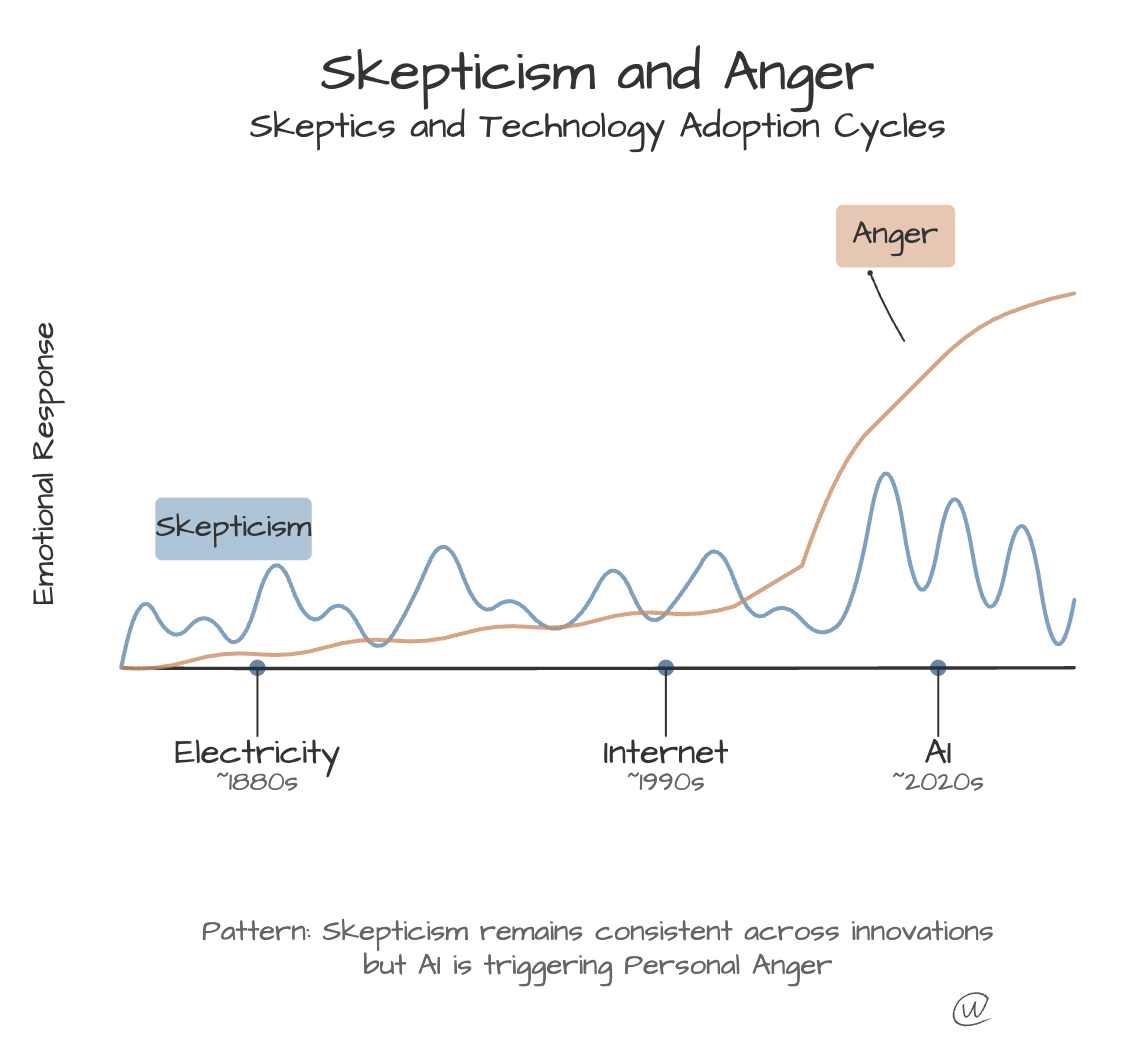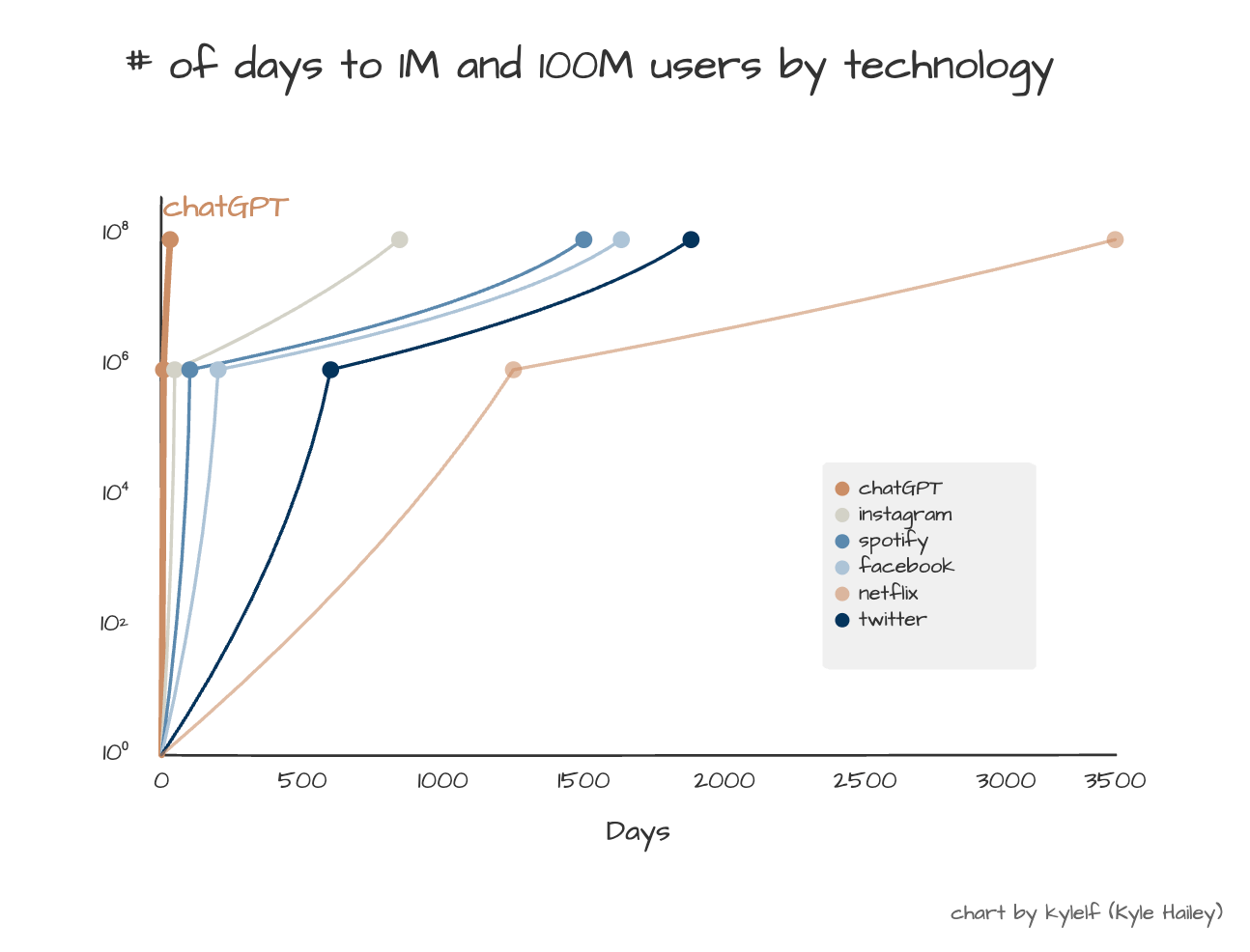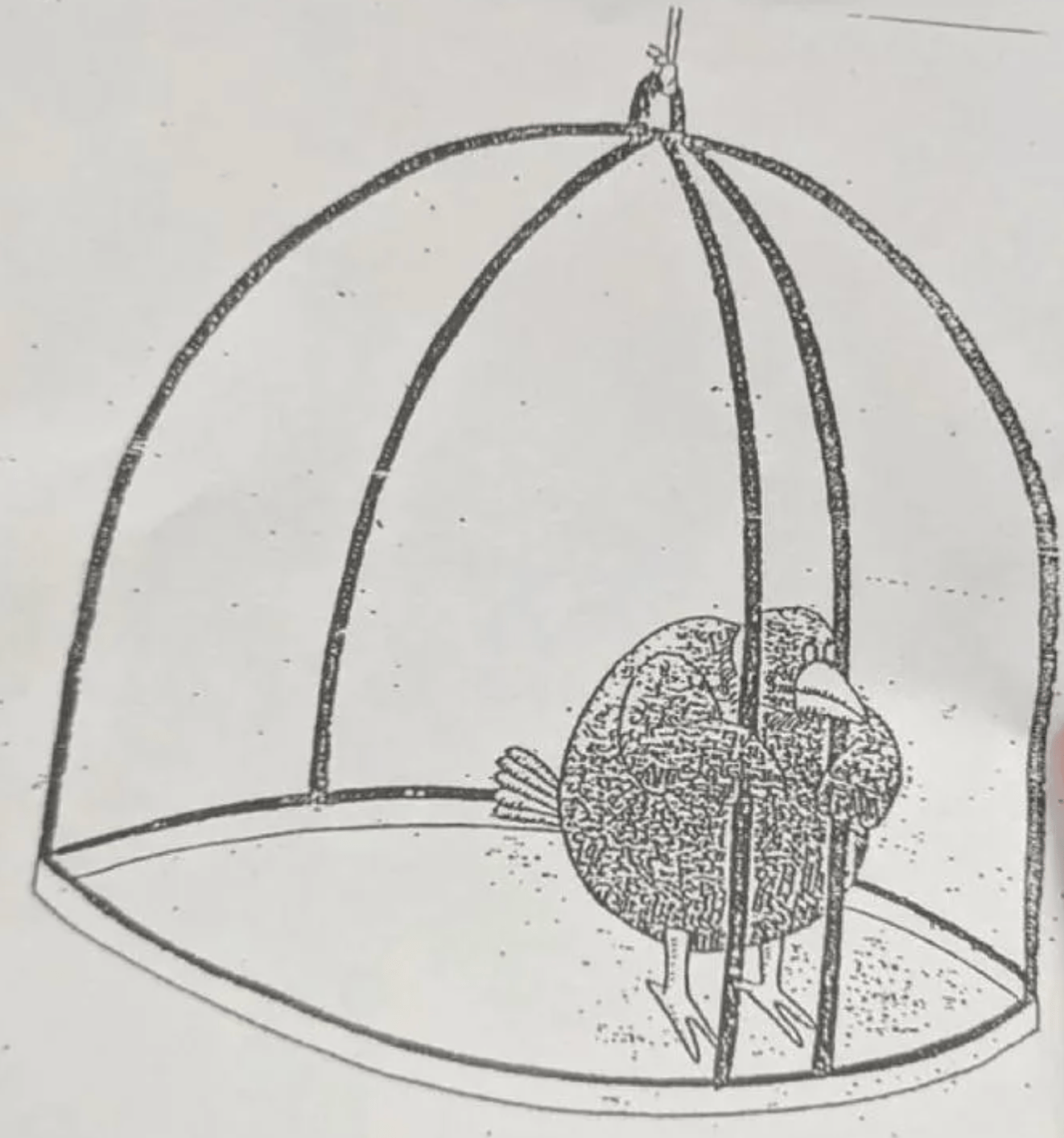- Be Datable
- Posts
- AI Skepticism is Getting Angry
AI Skepticism is Getting Angry
1999's Internet Skeptics Mirror Today's AI Critics, And One Word to Break the Cycle
Every week, I share content from Datable on LinkedIn and Twitter. Lately, the negativity surrounding AI has turned angry.
There's a pattern here, too. The criticism always spikes right before major model releases, as if AI skeptics can sense when capabilities are about to leap forward again. A few days ago, OpenAI released its new Agent tool, so the pattern is holding.
Today we launched a new product called ChatGPT Agent.
Agent represents a new level of capability for AI systems and can accomplish some remarkable, complex tasks for you using its own computer. It combines the spirit of Deep Research and Operator, but is more powerful than that
— Sam Altman (@sama)
5:36 PM • Jul 17, 2025
It’s also possible that skepticism and negativity toward AI grow when there has been a lull in new models or capabilities. Then new releases come out, and it quiets the skeptics again.
Historically, skepticism surrounding new technology, from electricity to the internet, has occurred in waves. This phenomenon also arises as groups enter the early adoption and testing phase of these novel inventions, but the anger toward AI is particularly noteworthy.
The AI skeptics are getting angry, and that’s a new twist on the familiar pattern.
I don’t plan on reposting some of the angry posts here, but it’s getting pretty frosty.

The Attacks Are Getting Personal
Today's AI critics repeat familiar complaints. The same arguments of “AI is not real intelligence,” or “It hallucinates,” or “It will never be trustworthy.”
However, what's different here is that the attacks have become both angry and personal.
People criticize AI as if they're attacking a rival colleague, rather than evaluating a technology. This aggressive anthropomorphism is fascinating, and I’ve never seen it before. It’s as though they are treating silicon like an adversary.
They also attack people who are early adopters of AI. I don’t mind this, but what’s fascinating is how skeptics are treating both the AI and its supporters as targets.
This reminds me of Alfred Adler's psychology, where all of our personal problems stem from our relationships with others. Except now we're applying that framework to AI. If I were back in college, I would start loading up on psychology classes to understand better and prepare for a world where humans and AI have full relationships.
By the way, The Courage to be Disliked is an excellent primer on Adlerian Psychology.
But let’s step back for a moment.
The world is having serious debates about consciousness, intelligence, and the capabilities and ethics of AI. The fact that we're having these conversations at all is extraordinary.
The world has many concerns to address. AI and its application to robotic machines will trigger some of the most extraordinary changes in history. Every economic theory of how society operates will have to be examined and rewritten. There should be both skepticism and fear, but the anger fascinates me.

I've Watched This Movie Before
In 1999, I founded a web-based research platform called Jaywalk. The company was built to bring independent equity research to investors. The entire industry was corrupted by biased research from investment banking and brokerage firms. Essentially, before Jaywalk, the only equity research you could find as an investor rated 99% of stocks as “Strong Buy” or “Buy.”
The name itself was rebellious: Jaywalking is crossing the street (Wall Street) when you aren’t supposed to.
As the Internet emerged and online trading exploded, established brokerages panicked. Their monopoly on information was crumbling. Clients could suddenly access research from anywhere.
The initial resistance and skepticism were fierce. The threat to the classic broker business model was significant, but by adapting to the internet, most were able to improve their businesses and services to customers.
Embracing the Internet took years. And there were skeptics then, too.
Today's AI resistance feels different, though. It's angrier. More personal. More blind to opportunity.

My feeds are full of posts mixing political grievances about AI companies with technical criticism. They focus on founders' personalities and corporate drama instead of asking the real questions.
What can this technology do today?
How can it make us more effective?
What opportunities does it create?

You're Already Using It
Many dismissed the Internet as a fad at the time. Now you can't function without it.
It’s also not like we aren’t already using AI every single day. Google search runs on it. Netflix recommendations depend on it. Your phone's autosuggest learns from it. The implementation of machine learning and LLMs into every platform is well underway.
AI adoption is the fastest technology adoption ever recorded. Faster than smartphones. Faster than the Internet. Faster than Instagram, Facebook, Netflix, X, and Spotify.

This chart, from two years ago, shows ChatGPT reaching 100 million users in 60 days.
Why?
Because AI builds on existing infrastructure. The Internet laid the foundation, and additional technologies like 5G and satellite connectivity have expanded access. Now, anyone with a phone can access intelligence that couldn’t exist a decade ago.
The only comparable shifts in my lifetime were the advent of the Internet and the widespread adoption of personal computers. Before that, you'd have to go back to electricity for this level of disruption.
Don't believe me? Have a conversation with ChatGPT or Claude about its own existence. To get the full experience, you must use the premium models. Try to argue with one of these AI systems on any topic of your choosing. Use voice mode if you can. The experience itself will challenge your assumptions.

The Mind Shift That Changes Everything
If you're skeptical, here's my challenge: Actually use these tools. Not for five minutes. Really use them. ChatGPT, Claude, Perplexity, Gemini.
More importantly, change your mental model.
Stop saying, AI can't do that.
Start saying
"AI can't do that… yet."
One word. Massive difference.
The dismissal trap catches smart people constantly. They dismiss current capabilities. They dismiss people building with these tools. They dismiss the entire category.
I watched this exact pattern with the Internet. Some of the most intelligent people in the room were often the most wrong.
Wil Reynolds shared a perfect image on Twitter the other day that embodies this skeptical mindset. A bird in a cage with only a few bars. But the bird fixates on those bars, unable to see that most of the cage is wide open.

Seriously, stop perseverating on what AI can’t do.
That's where many people are with AI. Staring at limitations while missing the vast open space.
Also, read this outstanding piece from Noah Smith that points out how pessimistic we are in the U.S. toward AI.

Let's Address the Real Concerns
Not all criticism is invalid. I've written about AI's excessive agreeability. Ethan Mollick warns about "sycophancy," creating echo chambers of yes-people that reinforce our biases.
I am starting to think sycophancy is going to be a bigger problem than pure hallucination as LLMs improve.
Models that won’t tell you directly when you are wrong (and justify your correctness) are ultimately more dangerous to decision-making than models that are sometimes wrong.
— Ethan Mollick (@emollick)
10:10 PM • Jul 13, 2025
Fair point. But social media already did that. At least with AI, we can try to build better systems. It is pretty challenging to develop better humans after a certain age.
Next, marketers will absolutely abuse AI. We’ve ruined every communication channel: phones, billboards, the Internet, and text messaging. AI-generated spam and fake reviews are already crushing the ecosystem.
But that's an argument for better AI, not no AI.
I envision a future with multiple AI options, each serving different needs. Subscription-based relationships that don't harvest personal data. Genuine utility without the stalker-like behavior of current ad-driven platforms.
For skeptics, the goalposts keep moving.
First, AI couldn't write. Then it couldn't reason. Now it can't be creative. Meanwhile, the dismissive miss their chance to influence development. By refusing to engage, they surrender their voice in shaping what comes next.
Start adding "yet" to your vocabulary. Engage with what's possible rather than fixating on current limitations. The cage is mostly open.
You just have to see it.



Reply